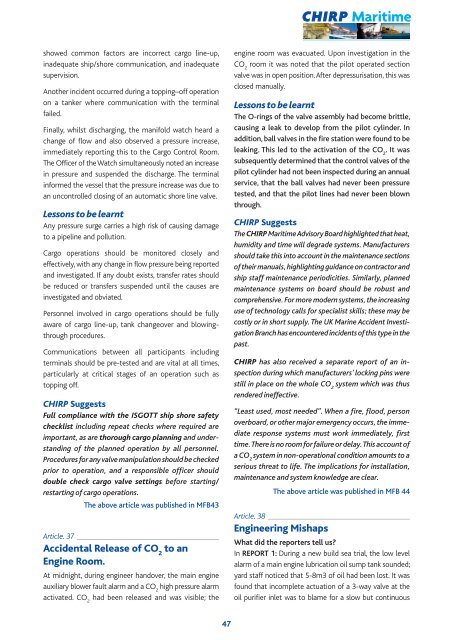CHIRP annual digest 2016 flip
You also want an ePaper? Increase the reach of your titles
YUMPU automatically turns print PDFs into web optimized ePapers that Google loves.
<strong>CHIRP</strong> Maritime<br />
showed common factors are incorrect cargo line-up,<br />
inadequate ship/shore communication, and inadequate<br />
supervision.<br />
Another incident occurred during a topping–off operation<br />
on a tanker where communication with the terminal<br />
failed.<br />
Finally, whilst discharging, the manifold watch heard a<br />
change of flow and also observed a pressure increase,<br />
immediately reporting this to the Cargo Control Room.<br />
The Officer of the Watch simultaneously noted an increase<br />
in pressure and suspended the discharge. The terminal<br />
informed the vessel that the pressure increase was due to<br />
an uncontrolled closing of an automatic shore line valve.<br />
Lessons to be learnt<br />
Any pressure surge carries a high risk of causing damage<br />
to a pipeline and pollution.<br />
Cargo operations should be monitored closely and<br />
effectively, with any change in flow pressure being reported<br />
and investigated. If any doubt exists, transfer rates should<br />
be reduced or transfers suspended until the causes are<br />
investigated and obviated.<br />
Personnel involved in cargo operations should be fully<br />
aware of cargo line-up, tank changeover and blowingthrough<br />
procedures.<br />
Communications between all participants including<br />
terminals should be pre-tested and are vital at all times,<br />
particularly at critical stages of an operation such as<br />
topping off.<br />
<strong>CHIRP</strong> Suggests<br />
Full compliance with the ISGOTT ship shore safety<br />
checklist including repeat checks where required are<br />
important, as are thorough cargo planning and under -<br />
standing of the planned operation by all personnel.<br />
Procedures for any valve manipulation should be checked<br />
prior to operation, and a responsible officer should<br />
double check cargo valve settings before starting/<br />
restarting of cargo operations.<br />
The above article was published in MFB43<br />
Article. 37<br />
Accidental Release of CO 2<br />
to an<br />
Engine Room.<br />
At midnight, during engineer handover, the main engine<br />
auxiliary blower fault alarm and a CO 2<br />
high pressure alarm<br />
activated. CO 2<br />
had been released and was visible; the<br />
engine room was evacuated. Upon investigation in the<br />
CO 2<br />
room it was noted that the pilot operated section<br />
valve was in open position. After depressurisation, this was<br />
closed manually.<br />
Lessons to be learnt<br />
The O-rings of the valve assembly had become brittle,<br />
causing a leak to develop from the pilot cylinder. In<br />
addition, ball valves in the fire station were found to be<br />
leaking. This led to the activation of the CO 2<br />
. It was<br />
subsequently determined that the control valves of the<br />
pilot cylinder had not been inspected during an <strong>annual</strong><br />
service, that the ball valves had never been pressure<br />
tested, and that the pilot lines had never been blown<br />
through.<br />
<strong>CHIRP</strong> Suggests<br />
The <strong>CHIRP</strong> Maritime Advisory Board highlighted that heat,<br />
humidity and time will degrade systems. Manufacturers<br />
should take this into account in the maintenance sections<br />
of their manuals, highlighting guidance on contractor and<br />
ship staff maintenance periodicities. Similarly, planned<br />
maintenance systems on board should be robust and<br />
comprehensive. For more modern systems, the increasing<br />
use of technology calls for specialist skills; these may be<br />
costly or in short supply. The UK Marine Accident Investi -<br />
gation Branch has encountered incidents of this type in the<br />
past.<br />
<strong>CHIRP</strong> has also received a separate report of an in -<br />
spection during which manufacturers’ locking pins were<br />
still in place on the whole CO 2<br />
system which was thus<br />
rendered ineffective.<br />
“Least used, most needed”. When a fire, flood, person<br />
overboard, or other major emergency occurs, the imme -<br />
diate response systems must work immediately, first<br />
time. There is no room for failure or delay. This account of<br />
a CO 2<br />
system in non-operational condition amounts to a<br />
serious threat to life. The implications for installation,<br />
maintenance and system knowledge are clear.<br />
The above article was published in MFB 44<br />
Article. 38<br />
Engineering Mishaps<br />
What did the reporters tell us?<br />
In REPORT 1: During a new build sea trial, the low level<br />
alarm of a main engine lubrication oil sump tank sounded;<br />
yard staff noticed that 5-8m3 of oil had been lost. It was<br />
found that incomplete actuation of a 3-way valve at the<br />
oil purifier inlet was to blame for a slow but continuous<br />
47



